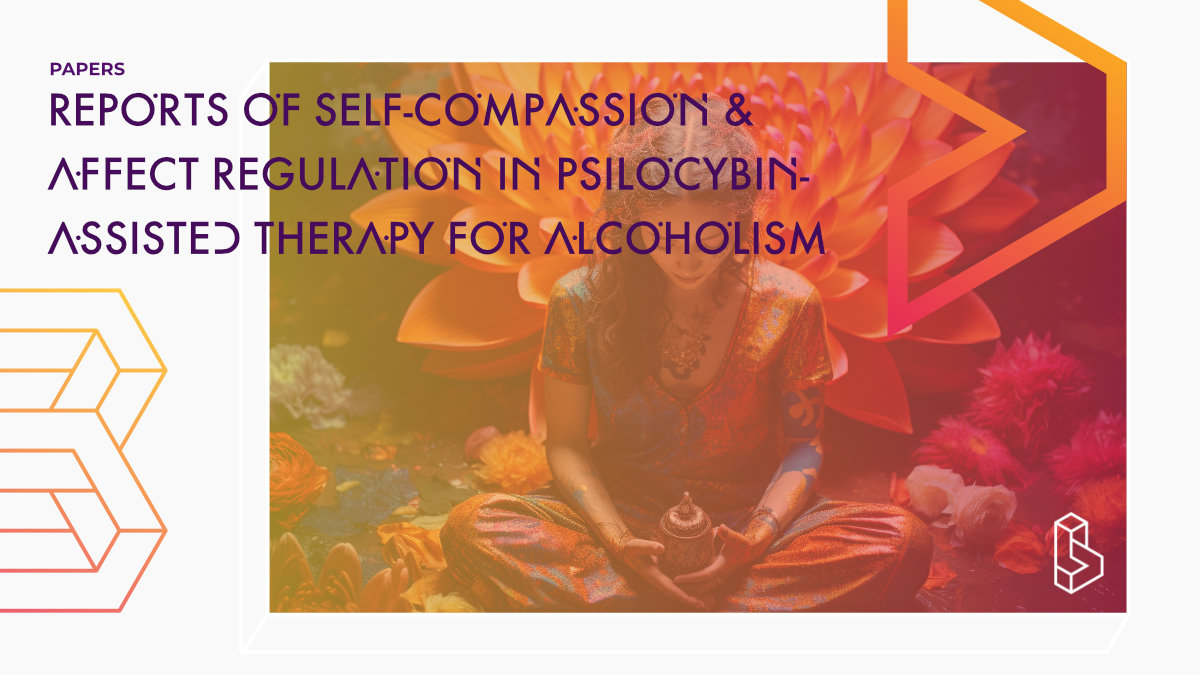This qualitative study (n=13) aimed to investigate the psychological mechanisms of change in psilocybin-assisted psychotherapy (PAT) for alcoholism (AUD). Participants reported that psilocybin treatment helped them process emotions related to past events, promoting self-compassion, self-awareness, and feelings of interconnectedness, which laid the foundation for better regulation of negative emotions and improved the quality of relationships. The study suggests that integrating self-compassion training with psychedelic therapy may enhance psychological outcomes in treating AUD.
Abstract of Reports of self-compassion & affect regulation in PAT for alcoholism
“Objective: The primary aim of this qualitative study was to delineate psychological mechanisms of change in the first randomized controlled trial of psilocybin-assisted psychotherapy to treat alcohol use disorder (AUD). Theories regarding psychological processes involved in psychedelic therapy remain underdeveloped.
Method: Participants (N = 13) mostly identified as non-Hispanic and White, with approximately equal proportions of cisgender men and women. Participants engaged in semistructured interviews about their subjective experiences in the study. Questions probed the nature of participants’ drinking before and after the study as well as coping patterns in response to strong emotions, stress, and cravings for alcohol. Verbatim transcripts were coded using Dedoose software, and content was analyzed with interpretive phenomenological analysis.
Results: Participants reported that the psilocybin treatment helped them process emotions related to painful past events and helped promote states of self-compassion, self-awareness, and feelings of interconnectedness. The acute states during the psilocybin sessions were described as laying the foundation for developing more self-compassionate regulation of negative affect. Participants also described newfound feelings of belonging and an improved quality of relationships following the treatment.
Conclusion: Our results support the assertion that psilocybin increases the malleability of self-related processing, and diminishes shame-based and self-critical thought patterns while improving affect regulation and reducing alcohol cravings. These findings suggest that psychosocial treatments that integrate self-compassion training with psychedelic therapy may serve as a useful tool for enhancing psychological outcomes in the treatment of AUD.”
Authors: Gabrielle Agin-Liebes, Elizabeth M. Nielson, Michael Zingman, Katherine Kim, Alexandra Haas, Lindsey T. Owens, Ursula Rogers, Michael Bogenschutz
Summary of Reports of self-compassion & affect regulation in PAT for alcoholism
The article sets out to clarify psychological mechanisms underlying psilocybin-assisted therapy for alcohol use disorder (AUD) by qualitatively analysing participants’ lived experiences after taking part in the first randomised controlled trial (RCT) of this treatment. AUD is framed as common, disabling, and marked by relapse despite established treatments. Earlier research with classic psychedelics, including small trials and observational studies, has pointed to clinically meaningful reductions in problematic alcohol and tobacco use, and the parent RCT reported substantially fewer heavy-drinking days with psilocybin than with an active placebo.
Psilocybin is described as a classic psychedelic whose acute effects last 4–6 hours and frequently include intensified emotion, altered perception, and a felt sense of unity. The authors underscore that drug effects in this therapy model are inseparable from the psychological context—preparation, therapeutic support during dosing, and integration—to produce rapid, durable, “transformational” change in self-related processing. Building on prior hints that psychedelics may enhance self-compassion, mindfulness, and emotion regulation, the study’s aim is to articulate the change processes that participants themselves attribute to the treatment across time—before, during, and after psilocybin.
Method
Find this paper
https://psycnet.apa.org/doi/10.1037/adb0000935
Paywall | Google Scholar | Backup | 🕊
Cite this paper (APA)
Agin-Liebes, G., Nielson, E. M., Zingman, M., Kim, K., Haas, A., Owens, L. T., ... & Bogenschutz, M. (2023). Reports of self-compassion and affect regulation in psilocybin-assisted therapy for alcohol use disorder: An interpretive phenomenological analysis. Psychology of Addictive Behaviors.
Study details
Compounds studied
Psilocybin
Topics studied
Alcohol Use Disorder
Addiction
Study characteristics
Interviews
Qualitative
Participants
13
Humans

